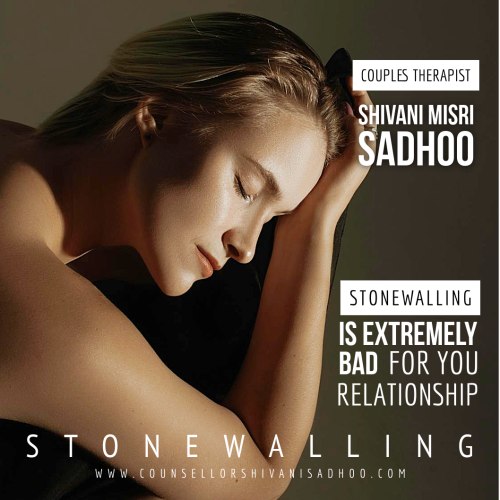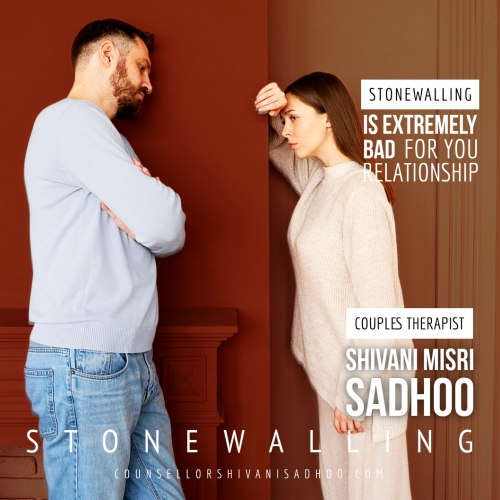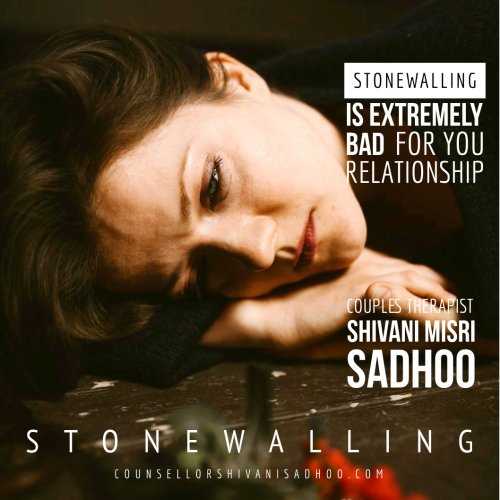Why Stonewalling is Extremely Bad for Your Relationship?
Healthy relationships thrive on communication, understanding, and emotional connection. When partners face conflicts, the way they respond can either strengthen their bond or gradually erode it. One destructive behavior that silently undermines relationships is stonewalling. Though it may seem like a harmless way to avoid confrontation, stonewalling can have long-term emotional consequences and create a toxic cycle between partners, says India’s top couples and marriage counsellor Shivani Misri Sadhoo in this article.
What is Stonewalling in relationships and marriages?
Stonewalling occurs when one partner withdraws from communication, shuts down emotionally, or refuses to engage in resolving issues. Instead of discussing problems or expressing feelings, the stonewalling partner may give the silent treatment, avoid eye contact, or physically leave the room. It is often a defence mechanism against stress, criticism, or emotional discomfort.
However, while it may provide temporary relief for the person stonewalling, it leaves the other partner feeling ignored, rejected, and emotionally abandoned. Shivani Misri Sadhoo, a leading relationship expert, certified DBT & CBT therapist and one of the top marriage counsellors in Delhi and India, says there are many factors, these are:
Why is Stonewalling Detrimental?
Breaks Emotional Connection
Relationships rely on emotional intimacy and mutual support. When one partner consistently stonewalls, it creates a barrier between them and their partner. Over time, the partner on the receiving end may feel unloved or unimportant, which erodes trust and intimacy. Emotional disconnection often leads to feelings of isolation, resentment, and frustration.
Prevents Conflict Resolution
Conflict is inevitable in any relationship, but healthy disagreements help partners understand each other better and find solutions. Stonewalling interrupts this process entirely. When one partner refuses to communicate, problems remain unresolved, often escalating tension. This unresolved conflict can fester and eventually create a hostile or distant environment.
Triggers a Negative Cycle
Stonewalling rarely exists in isolation. It can trigger what psychologists call the “demand-withdraw pattern”, where one partner pressures for communication while the other withdraws. This cycle can intensify arguments and create a repeating loop of frustration, blame, and emotional withdrawal. Over time, it can be difficult to break this pattern without conscious effort and counseling.
Impacts Mental Health
Being on the receiving end of stonewalling can have serious psychological effects. It can lead to anxiety, depression, low self-esteem, and feelings of helplessness. The partner may constantly question their worth or blame themselves for the silence, creating emotional strain that spills over into other areas of life.
Erodes Trust and Security
A relationship’s foundation is built on trust and the assurance that both partners are willing to support and listen to each other. Stonewalling breaks this foundation. When a partner repeatedly shuts down, it signals avoidance rather than a willingness to work through issues. This lack of reliability can make the relationship feel unsafe and unpredictable.
Stonewalling may feel like an easy escape from a difficult conversation, but it is a destructive habit that weakens emotional bonds and prevents resolution. Couples must recognize this behavior early and work on healthier communication strategies, such as expressing feelings openly, practicing empathy, and taking breaks when emotions run high rather than shutting down entirely. By addressing stonewalling proactively, couples can maintain emotional intimacy, strengthen trust, and create a supportive environment where both partners feel heard and valued.
- Are You an Echoist? How It Differs from People-Pleasing - February 27, 2026
- What Is “Friendfluence,” One of the Top Dating Trends of 2026? - February 23, 2026
- Why Chocolate is the Ultimate Symbol of Love? Answers Expert - February 13, 2026



